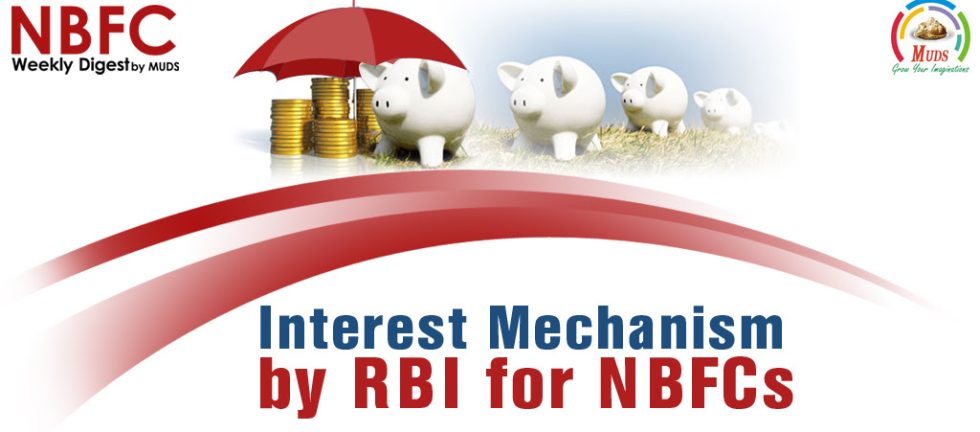NBFC Weekly Digest – Edition 3
Interest Mechanism by RBI for NBFCs
Non-Banking Financial Companies (NBFCs) in India are engaged in varied activities to provide a range of financial services. NBFCs can be classified into two main categories:-
- NBFCs accepting public deposit (NBFCs-D)
- NBFCs not holding/accepting public deposit (NBFCs-ND)
“It is important to know the interest mechanism of NBFCs so that the investors can take informed decisions and precautions, besides taking redressal measures”
– Mir Irfan (Market Analyst, MUDS Management Pvt Ltd)
How does Acquisitions of NBFCs happen ?
Residuary Non-Banking Companies (RNBCs) constitute another category of NBFCs whose main business is to accept deposits and invest in approved securities.
- NBFCs excluding RNBCs cannot offer a rate of interest on deposits more than that approved by RBI from time to time (at present 12.5%). They cannot accept deposit for any period less than 12 months and greater than 60 months
- However, RNBCs should offer a rate of interest of not less than 5% per year on term deposits and 3.5% on daily deposits, both compounded annually, under extant directions. RNBCs cannot accept deposits for a period less than 12 months and more than 84 months.
“Promoters of NBFCs should be aware of the points on which RBI alerts the investors. NBFCs should know on what basis their authenticity is evaluated”
– Divya Gupta (Market Analyst, MUDS Management Pvt Ltd)
RBI’s Precautions for Investors
- Before investing in schemes that offer higher rates of return, investors should ensure that the NBFC offering such returns is registered with a financial sector regulator and is authorized to receive funds, whether in terms of deposits or otherwise.
- Investors should generally be cautious if the interest rates or rates of return on investments promised are high. Unless the NBFC accepting funds is able enough to earn more than what it offers; it will not be able to repay the investors as offered. For earning high returns, the NBFC will have to take high risks on its investments. Higher the risk, the more speculative are the investments, and there can be no assured return. The public should alert themselves that the possibilities of losing money in schemes that promise high rates of interest are more.
- NBFCs including RNBCs can accept deposit only against issue of proper receipt. The receipt should mention the name of the depositor, the amount, rate of interest payable, and the date of repayment along with the maturity amount.
In case, a deposit taking NBFC fails to repay the deposit or the interest accrued,in accordance with the terms and conditions of acceptance of such deposit, redressal of grievance can be through the Regional Bench of the Company Law Board at Chennai/Delhi/Kolkata/Mumbai
– Isha Malik (Company Secretary, MUDS Management Pvt Ltd)

List of RBI Regulations to Follow
RBI has issued detailed certain regulations to ensure that the NBFCs function on the sound line. These are developed on the following:-
- Deposit acceptance
- Mandatory credit rating
- Maintenance of liquid assets
- Manner of maintenance
- And prudential regulations including maintenance of capital, limitations on exposures, as well as inspection of the NBFCs
Points of Caution
- If the Bank observes, through its audit or inspection of any NBFC, and also through complaints or market intelligence, that one NBFC is not in compliance with RBI directions, it may prohibit the NBFC from selling its assets, or accepting further deposits.
- If the depositor has complained to the Company Law Board (CLB) which has ordered repayment and the NBFC has not complied with the CLB order; RBI can initiate prosecution of the NBFC, including criminal action and winding up of the company.

Basis RBI’s Action
Importantly, RBI initiates prompt action, including imposing penalties and taking legal action against companies found to be violating RBI’s norms/instructions on the basis of:-
- Complaints
- Market Intelligence reports
- Exception reports from statutory auditors of the companies
- Information received through SLCC meetings, etc.
The Reserve Bank immediately shares this information with all the financial sector regulators as well as enforcement agencies in the State Level Coordination Committee Meetings.
In the interest of depositors, RBI has a regulatory framework the salient features of which are published for the public regularly for the guidance of depositors. The investors should carefully evaluate their investment decisions while investing in NBFCs.
“Follow the rules before RBI follows you”
– Shweta Gupta, Founder and CEO, MUDS
Alternately Call our NBFC Expert Now For Free Consultation at +91 9599672352






